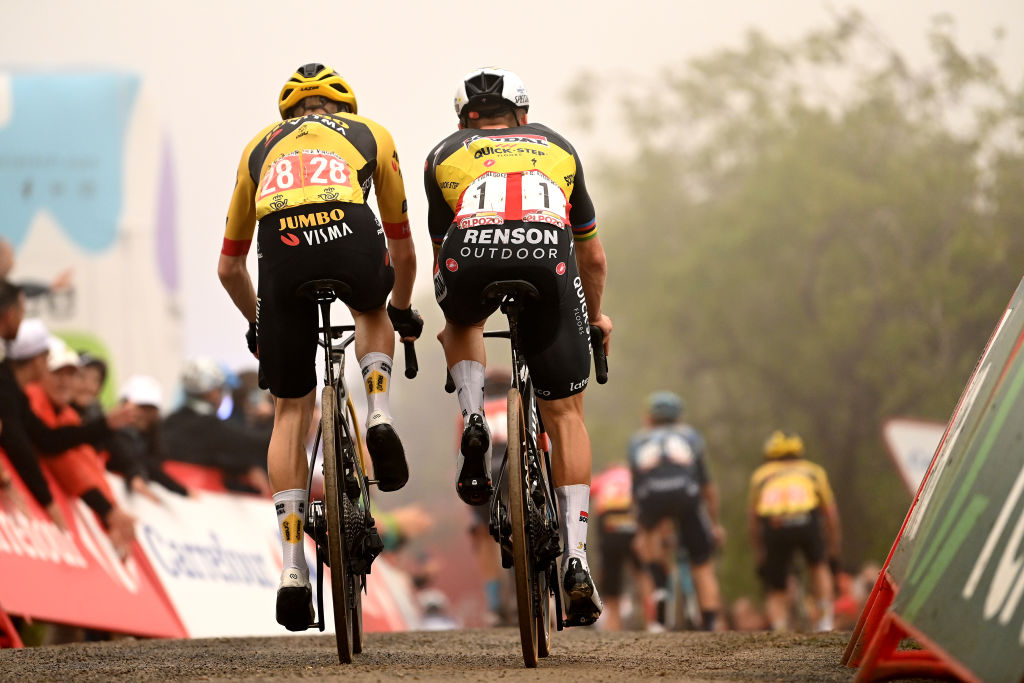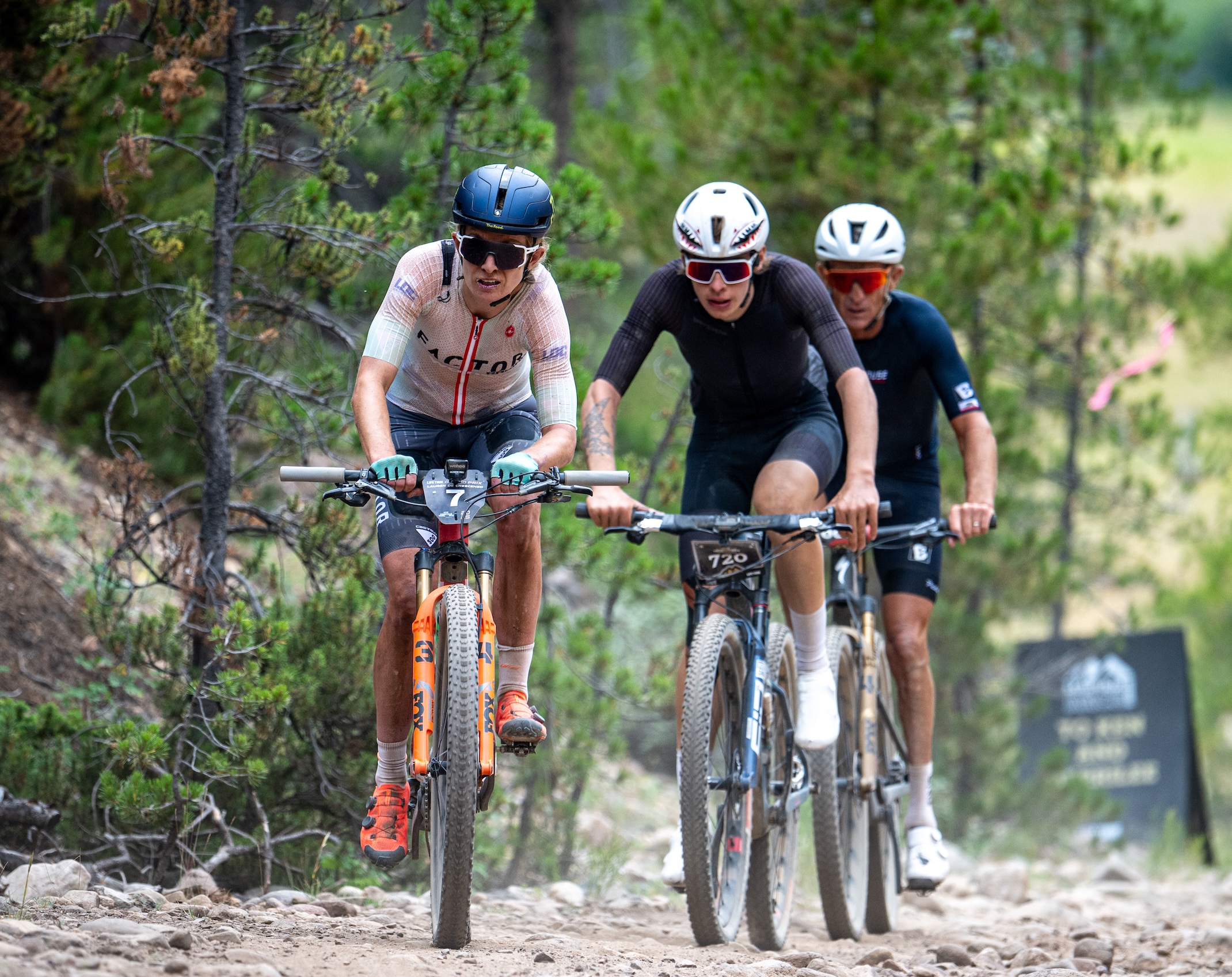Vuelta a España’s partial neutralisation of stage 9 final climb sparks safety questions
Top riders back decision to neutralise final two kilometres after mudspill in last corner

The latest race content, interviews, features, reviews and expert buying guides, direct to your inbox!
You are now subscribed
Your newsletter sign-up was successful
A decision by Vuelta a España organisers to neutralise the final two kilometres of the Collado de la Cruza de Caravaca summit finish on Sunday has sparked a fresh safety controversy.
Mud on the highest part of the narrow, roughly surfaced descent, the indirect result of the very heavy intermittent rainfall that caused significant flooding across much of central and eastern Spain on Sunday, caused organisers to announce that GC times would be taken before the finish.
Several vehicles were blocked on the route, and mud spilled across one sweeping right-hand corner just in sight of the line so an initial decision to take the times 2.6 kilometres from the line was later substituted by a decision to take times at 2.05 kilometres.
In scenes reminiscent of cycling from bygone eras, when the riders arrived at the point, TV images showed one of the Vuelta's technical directors, Fernando Escartín, standing on the side of the road by a gate, waving a yellow flag to warn the riders of the improvised end of the GC race. Race commissaires stood nearby taking down numbers, while a camera filmed the riders as they went through the 'line' to confirm their positions and times.
"We took this decision with 30 kilometres to go," Escartín told Spanish newspaper AS. "It was a very risky situation."
The part-neutralisation was the second in a week in the Vuelta, after the organisers took the GC times on stage 2 prior to the riders entering a final circuit at Montjuic park in Barcelona, which had also become dangerous because of heavy rain.
The leading Belgian sports news agency Sporza severely criticised the way the stage 9 finish situation had been handled, saying “After the first week of the Vuelta there is one clear loser and that is the organisation itself," and that their race commentators considered it “unworthy of a Grand Tour.”
The latest race content, interviews, features, reviews and expert buying guides, direct to your inbox!
Belgian newspaper Het Laatste Nieuws even went so far as to say it was a “New page in the great amateurism book of the Vuelta.”
Top riders, on the other hand, including race leader Sepp Kuss (Jumbo-Visma), teammate and fellow contender Primož Roglič as well as rivals Remco Evenepoel (Soudal-QuickStep) and Enric Mas (Movistar) all threw their weight behind the organisers last-minute decision.
“You can't control the weather,” Mas told reporters at the line. "If the weather had been normal in Murcia it would have been a spectacular stage.”
“It’s a pity for the people who come to see the stage and the villages that pay for the race.”
“We’re overly used to not thinking about rider safety but we’re people and we’ve got families,” Mas added. “It's good that the organisation thinks about us and takes these measures.”
“I’m happy that the finish is not completely at the top,” added Roglič, “because it was quite tricky with corner and mud on the road.”
While the sight of the GC riders rolling across the finish line in a relatively relaxed manner in dribs and drabs confirmed exactly how greatly the decision had impacted the race finale, race organisers were adamant it was the right decision.
"It was all on the spur of the moment" Escartín's co-technical director Kiko García, told AS. "They called us from the finish to say there was a lot of mud out there, and we decided to do it for the safety of the riders."
"It was all our initiative and I think the teams were grateful for it. We opted for that point because it was just after a 20% ramp so we'd avoid risks on the descent." The time bonuses, unlike at Barcelona's altered finish at stage 2, were also wiped from the day's racing.
The question of rider safety in the Vuelta has cropped up with relentless regularity in this year's race, after the issues with the rain and dark in Barcelona's opening TTT, the partial suspension of the stage 2 finish and Remco Evenepoel's crash after stage 3 when he collided with a member of the Andorran police force.
Given the atrocious weather across much of Spain this weekend, with as much rain forecast to fall in a single day in Madrid as it has had in the entire year so far, the Vuelta has been fortunate that both of its stages, albeit one in slightly truncated form, could have taken place.
Elsewhere in Spain, storm warnings are in place in multiple different regions, railway services and roads have been severely disrupted or blocked by the heavy rain and winds. On Sunday mayor of Madrid, where there is a 'red alert' warning, told the population not to leave their homes in view of the dangerous weather conditions.
Alasdair Fotheringham has been reporting on cycling since 1991. He has covered every Tour de France since 1992 bar one, as well as numerous other bike races of all shapes and sizes, ranging from the Olympic Games in 2008 to the now sadly defunct Subida a Urkiola hill climb in Spain. As well as working for Cyclingnews, he has also written for The Independent, The Guardian, ProCycling, The Express and Reuters.

